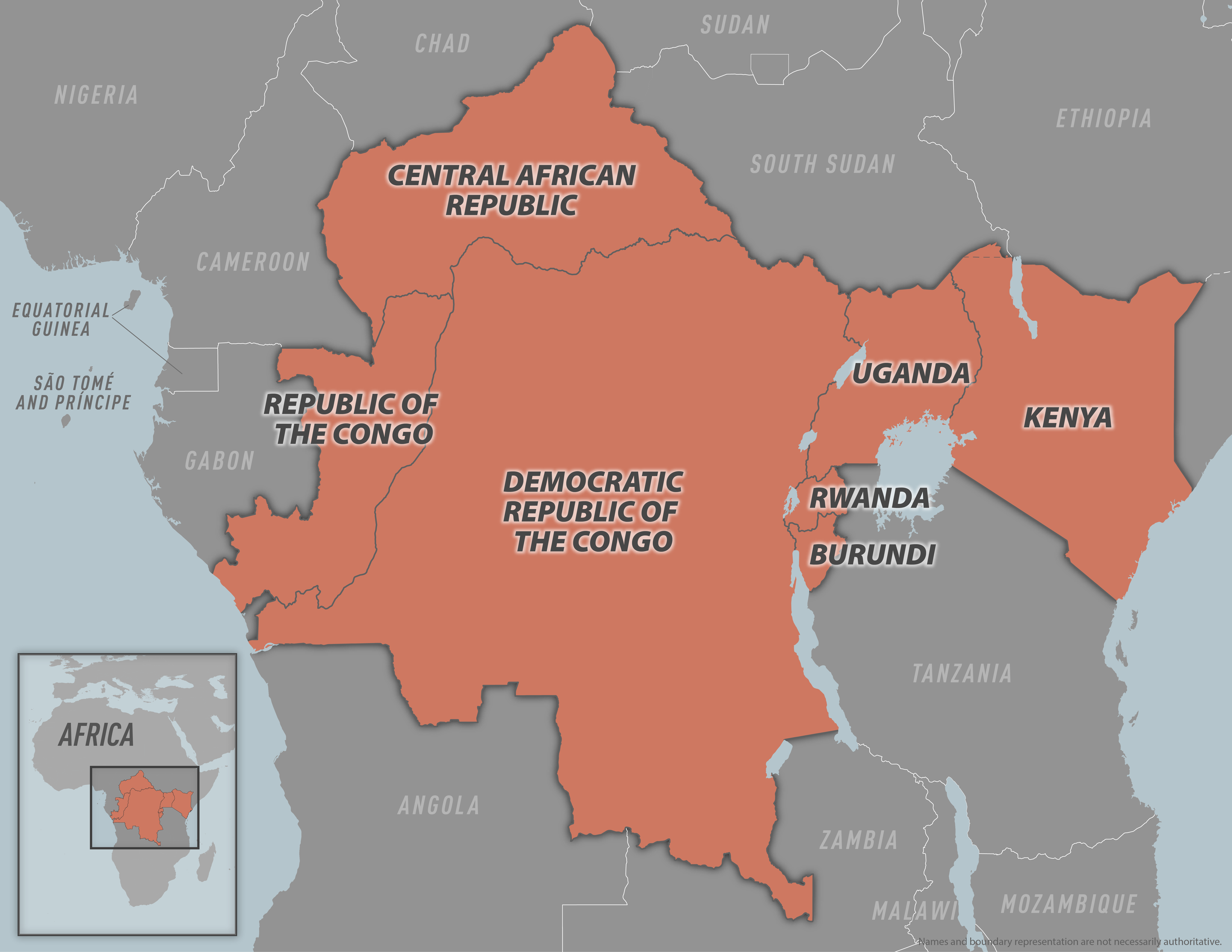Clade I Mpox in Central and Eastern Africa
Key points
- There is an outbreak of clade I mpox in Central and Eastern Africa. There is ongoing person-to-person transmission of mpox in Burundi, Central African Republic, Democratic Republic of the Congo (DRC), Kenya, the Republic of the Congo, Rwanda, Tanzania, Uganda, and Zambia (see map).
- Person-to-person transmission has occurred through various means during this outbreak, including sexual contact, day-to-day household contact, and within the healthcare setting (in the absence of appropriate access to or use of personal protective equipment). There has also been transmission from contact with certain live or dead wild animals.
- Mpox vaccination is recommended for people who anticipate the following sexual activities during travel to countries with ongoing person-to-person transmission of clade I mpox:
- Sex with a new partner
- Sex at a commercial sex venue (e.g., sex club or bathhouse)
- Sex or intimate contact (e.g. massage) in exchange for money, goods, drugs, or other trade
- Sex in association with a large public event (e.g., rave, party, or festival)
- All people should avoid situations that might increase their risk for mpox, but especially people with risk factors for infection and/or who are at risk for severe disease (e.g., pregnant women, infants younger than 1 year, people with eczema or active skin conditions, and people who are immunocompromised).
- If you travel to affected countries, learn more about which activities may increase your risk for mpox and how you can reduce your risk of mpox, including getting vaccinated if you’re eligible.
- Avoid close contact with people who are sick with signs and symptoms of mpox, including those with skin or genital lesions.
- Avoid contact with contaminated materials used by people who are sick (such as clothing, bedding, or materials used in healthcare settings) or that came into contact with wild animals.
- Avoid contact with wild animals (alive or dead), such as small mammals, including rodents (rats, squirrels), and non-human primates (monkeys, apes).
- Avoid eating or preparing meat from wild animals (bushmeat) or using products (creams, lotions, powders) derived from wild animals.
- For those eligible for mpox vaccination, get two doses of the JYNNEOS vaccine at least 28 days apart.
- If you are at risk for mpox and have only received one dose, get a second dose as soon as possible.
- It takes about two weeks after the second dose for maximum protection against mpox. Be sure to plan ahead.
- Whether or not you’re fully vaccinated when you travel, protect yourself from mpox.
- Seek medical care immediately if you develop new, unexplained skin rash (lesions on any part of the body), with or without fever and chills, and avoid contact with others.
- Tell your doctor or healthcare provider where you traveled during the last 21 days before developing symptoms.
- If you are sick and could have mpox, follow isolation and infection control measures at home and during travel. See additional information about what to do if you are sick with mpox.
Traveler Information
- Health Information for Travelers to Burundi
- Health Information for Travelers to Central African Republic
- Health Information for Travelers to the Democratic Republic of the Congo
- Health Information for Travelers to Republic of the Congo
- Health Information for Travelers to Kenya
- Health Information for Travelers to Rwanda
- Health Information for Travelers to Tanzania
- Health Information for Travelers to Uganda
- Health Information for Travelers to Zambia
- Travelers' Health: Avoid Animals
- Preventing Mpox While Traveling
- CDC Mpox Website
Clinician Information
- CDC Health Alert Network (HAN), September 23, 2024: Prevention Strategies for Mpox, including Vaccinating People at Risk via Sexual Exposure, for U.S. Travelers Visiting Countries with Clade I Mpox Outbreaks
- CDC Health Alert Network (HAN) Advisory, December 7, 2023: Mpox Caused by Human-to-Human Transmission of Monkeypox Virus in the Democratic Republic of the Congo with Geographic Spread to Neighboring Countries
- CDC Health Alert Network (HAN) Advisory, November 18, 2024: First Case of Clade I Mpox Diagnosed in the United States
- Mpox Information for Clinicians
- Mpox Veterinary Guidance
- Smallpox & Other Orthopoxvirus-Associated Infections in the CDC Yellow Book (Health Information for International Travel)
- Sex & Travel in the CDC Yellow Book (Health Information for International Travel)
Mpox is a disease caused by infection with Monkeypox virus. Mpox is endemic in forested areas of Central and West Africa.
There are two types of Monkeypox virus. Historically, clade I has been associated with a higher percentage of people with mpox developing severe illness or dying, compared to clade II.
People usually get mpox through contact with the skin lesions or bodily fluids of infected wild animals in Africa (alive or dead) or humans, including respiratory secretions, or through contact with materials contaminated with the virus such as bedding, clothing, and sex toys. Transmission also occurs through intimate or close contact, including sex, with an infected person.
Symptoms often include fever (≥100.4°F), rash, headache, muscle aches, and swollen lymph nodes. Fever is not always present.
There is a vaccine available for mpox for those with certain risk factors.
